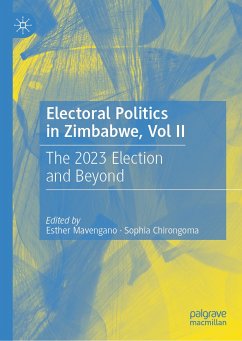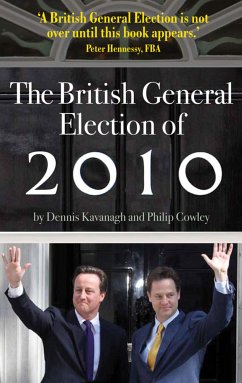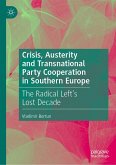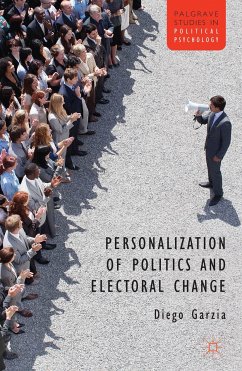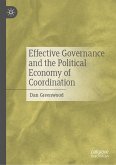Electoral Politics in Zimbabwe, Vol II (eBook, PDF)
The 2023 Election and Beyond
149,79 €
inkl. MwSt.
Sofort per Download lieferbar

0 °P sammeln
Electoral Politics in Zimbabwe, Vol II (eBook, PDF)
The 2023 Election and Beyond
- Format: PDF
- Merkliste
- Auf die Merkliste
- Bewerten Bewerten
- Teilen
- Produkt teilen
- Produkterinnerung
- Produkterinnerung

Bitte loggen Sie sich zunächst in Ihr Kundenkonto ein oder registrieren Sie sich bei
bücher.de, um das eBook-Abo tolino select nutzen zu können.
Hier können Sie sich einloggen
Hier können Sie sich einloggen
Sie sind bereits eingeloggt. Klicken Sie auf 2. tolino select Abo, um fortzufahren.

Bitte loggen Sie sich zunächst in Ihr Kundenkonto ein oder registrieren Sie sich bei bücher.de, um das eBook-Abo tolino select nutzen zu können.
Volume two of Electoral Politics in Zimbabwe: The 2023 Election and Beyond argues that research into Zimbabwe’s politics is multifaceted and topical, particularly because for more than two decades now, this Southern African state has been dogged by multiple problems including hyperinflation, drought, escalating poverty levels, extremely high unemployment rates and political instabilities. The volume’s overall goal is to ignite intellectual discussions and practical action towards turning the political wheels that have been in place for decades. The first segment examines the interface between…mehr
- Geräte: PC
- ohne Kopierschutz
- eBook Hilfe
- Größe: 6.54MB
- Upload möglich
Andere Kunden interessierten sich auch für
![The British General Election of 2010 (eBook, PDF) The British General Election of 2010 (eBook, PDF)]() Dennis KavanaghThe British General Election of 2010 (eBook, PDF)94,95 €
Dennis KavanaghThe British General Election of 2010 (eBook, PDF)94,95 €![The Palgrave Handbook of Radical Left Parties in Europe (eBook, PDF) The Palgrave Handbook of Radical Left Parties in Europe (eBook, PDF)]() The Palgrave Handbook of Radical Left Parties in Europe (eBook, PDF)227,95 €
The Palgrave Handbook of Radical Left Parties in Europe (eBook, PDF)227,95 €![Crisis, Austerity and Transnational Party Cooperation in Southern Europe (eBook, PDF) Crisis, Austerity and Transnational Party Cooperation in Southern Europe (eBook, PDF)]() Vladimir BortunCrisis, Austerity and Transnational Party Cooperation in Southern Europe (eBook, PDF)117,69 €
Vladimir BortunCrisis, Austerity and Transnational Party Cooperation in Southern Europe (eBook, PDF)117,69 €![The Political System of Germany (eBook, PDF) The Political System of Germany (eBook, PDF)]() Florian GrotzThe Political System of Germany (eBook, PDF)149,79 €
Florian GrotzThe Political System of Germany (eBook, PDF)149,79 €![Personalization of Politics and Electoral Change (eBook, PDF) Personalization of Politics and Electoral Change (eBook, PDF)]() D. GarziaPersonalization of Politics and Electoral Change (eBook, PDF)71,95 €
D. GarziaPersonalization of Politics and Electoral Change (eBook, PDF)71,95 €![The Muslim Brotherhood in Kuwait (eBook, PDF) The Muslim Brotherhood in Kuwait (eBook, PDF)]() Ali A. AlkandariThe Muslim Brotherhood in Kuwait (eBook, PDF)117,69 €
Ali A. AlkandariThe Muslim Brotherhood in Kuwait (eBook, PDF)117,69 €![Effective Governance and the Political Economy of Coordination (eBook, PDF) Effective Governance and the Political Economy of Coordination (eBook, PDF)]() Dan GreenwoodEffective Governance and the Political Economy of Coordination (eBook, PDF)53,49 €
Dan GreenwoodEffective Governance and the Political Economy of Coordination (eBook, PDF)53,49 €- -64%11
-
-
Volume two of Electoral Politics in Zimbabwe: The 2023 Election and Beyond argues that research into Zimbabwe’s politics is multifaceted and topical, particularly because for more than two decades now, this Southern African state has been dogged by multiple problems including hyperinflation, drought, escalating poverty levels, extremely high unemployment rates and political instabilities. The volume’s overall goal is to ignite intellectual discussions and practical action towards turning the political wheels that have been in place for decades. The first segment examines the interface between gender and electoral politics in Zimbabwe. The second part discusses the role of the media in Zimbabwe’s electoral politics. The third section reflects on the role of traditional leaders and religious discourses in Zimbabwe’s electoral politics. The book will be a key resource to colleges, universities and organisations in Zimbabwe, the Southern Africa region andeven beyond.
Produktdetails
- Produktdetails
- Verlag: Springer Nature Switzerland
- Erscheinungstermin: 8. August 2023
- Englisch
- ISBN-13: 9783031337963
- Artikelnr.: 68555923
- Verlag: Springer Nature Switzerland
- Erscheinungstermin: 8. August 2023
- Englisch
- ISBN-13: 9783031337963
- Artikelnr.: 68555923
- Herstellerkennzeichnung Die Herstellerinformationen sind derzeit nicht verfügbar.
Esther Mavengano is Lecturer in the Faculty of Arts at Great Zimbabwe University in Masvingo, Zimbabwe. She is also Research Fellow at the Research Institute for Theology and Religion, UNISA, South Africa, and Alexander von Humboldt Postdoctoral Research Fellow at the Institute of English and American Studies, Technischen Universität Dresden, Germany.
Sophia Chirongoma is Senior Lecturer in the Religious Studies Department at Midlands State University, Zimbabwe. She is also Academic Associate/Research Fellow at the Research Institute for Theology and Religion at the University of South Africa.
Sophia Chirongoma is Senior Lecturer in the Religious Studies Department at Midlands State University, Zimbabwe. She is also Academic Associate/Research Fellow at the Research Institute for Theology and Religion at the University of South Africa.
Chapter 1. Introduction: The Nexus Between Gender, Religion and the Media in Zimbabwean Electoral politics.- Section A: Gender and electoral politics in Zimbabwe. Chapter 2. Electoral Participation as a fundamental right for women with disabilities in Zimbabwe.- Chapter 3. Unpacking the issue of gender and electoral violence in Christopher Mlalazi’s They Are Coming.- Chapter 4. Shona Women and Grassroots Politics in Zimbabwe: Prospects for the 2023 General Elections.- Chapter 5. Critical thinking, Gender and Electoral politics in Zimbabwe.- Chapter 6. Of pains, regrets and suppressed desires: Gendered Politics and Women Activism in Zimbabwean Electoral Politics.- Chapter 7. Rhetoric or reality? Assessing the efficacy of Policy and legislative interventions in enhancing women political participation in Zimbabwe.- Chapter 8.Post-independence election violence: Re-thinking the marginalisation of Women in Zimbabwean politics.- Chapter 9. Voter Rights and Gender: An Analysis of theImportance of Voter Education in Zimbabwe. Section B: Media and electoral politics in Zimbabwe. Chapter 10. Pollytricking or political contestation? The digital space as alternative public sphere in the run up to the 2023 public election in Zimbabwe.- Chapter 11. Zimbabwean Press and electoral violence: a framing analysis of the March 2022 by-elections.- Chapter 12. Melancholia and polysemanticism in Winky D’s sonic retentions: Subverting expressive barricades and voicing the electoral process through performance.- Chapter 13. The morbidity of Zimbabwe’s transformational politics: Hope or doom in the post-coup era?.- Chapter 14. The rhetoric of Onoma and the intersection of memory and power dynamics in naming and name-calling in Zimbabwe’s electoral politics.- Chapter 15. The Effectiveness of social media in mitigating unfair Mainstream media electoral coverage in Zimbabwe.- Section C: Traditional Leaders and electoral politics in Zimbabwe. Chapter 16. Traditional leadersas vote brokers and king makers in Zimbabwe’s Elections.- Chapter 17.The institution of Traditional leadership and partisan politics in Zimbabwe.- Chapter 18. The Role of Traditional Leaders and Culture in Zimbabwean Elections.- Chapter 19. A critique of the responsibility of traditional leaders in the electoral process: A Zimbabwean experience.- Chapter 20. Abusing the traditional sceptre: Chiefs and electoral collusion in Zimbabwe.- Chapter 21. Traditional Leaders, Electoral Politics and Impregnability of the Rural Constituency in Zimbabwe.
Chapter 1. Introduction: The Nexus Between Gender, Religion and the Media in Zimbabwean Electoral politics.- Section A: Gender and electoral politics in Zimbabwe. Chapter 2. Electoral Participation as a fundamental right for women with disabilities in Zimbabwe.- Chapter 3. Unpacking the issue of gender and electoral violence in Christopher Mlalazi's They Are Coming.- Chapter 4. Shona Women and Grassroots Politics in Zimbabwe: Prospects for the 2023 General Elections.- Chapter 5. Critical thinking, Gender and Electoral politics in Zimbabwe.- Chapter 6. Of pains, regrets and suppressed desires: Gendered Politics and Women Activism in Zimbabwean Electoral Politics.- Chapter 7. Rhetoric or reality? Assessing the efficacy of Policy and legislative interventions in enhancing women political participation in Zimbabwe.- Chapter 8.Post-independence election violence: Re-thinking the marginalisation of Women in Zimbabwean politics.- Chapter 9. Voter Rights and Gender: An Analysis of theImportance of Voter Education in Zimbabwe. Section B: Media and electoral politics in Zimbabwe. Chapter 10. Pollytricking or political contestation? The digital space as alternative public sphere in the run up to the 2023 public election in Zimbabwe.- Chapter 11. Zimbabwean Press and electoral violence: a framing analysis of the March 2022 by-elections.- Chapter 12. Melancholia and polysemanticism in Winky D's sonic retentions: Subverting expressive barricades and voicing the electoral process through performance.- Chapter 13. The morbidity of Zimbabwe's transformational politics: Hope or doom in the post-coup era?.- Chapter 14. The rhetoric of Onoma and the intersection of memory and power dynamics in naming and name-calling in Zimbabwe's electoral politics.- Chapter 15. The Effectiveness of social media in mitigating unfair Mainstream media electoral coverage in Zimbabwe.- Section C: Traditional Leaders and electoral politics in Zimbabwe. Chapter 16. Traditional leadersas vote brokers and king makers in Zimbabwe's Elections.- Chapter 17.The institution of Traditional leadership and partisan politics in Zimbabwe.- Chapter 18. The Role of Traditional Leaders and Culture in Zimbabwean Elections.- Chapter 19. A critique of the responsibility of traditional leaders in the electoral process: A Zimbabwean experience.- Chapter 20. Abusing the traditional sceptre: Chiefs and electoral collusion in Zimbabwe.- Chapter 21. Traditional Leaders, Electoral Politics and Impregnability of the Rural Constituency in Zimbabwe.
Chapter 1. Introduction: The Nexus Between Gender, Religion and the Media in Zimbabwean Electoral politics.- Section A: Gender and electoral politics in Zimbabwe. Chapter 2. Electoral Participation as a fundamental right for women with disabilities in Zimbabwe.- Chapter 3. Unpacking the issue of gender and electoral violence in Christopher Mlalazi’s They Are Coming.- Chapter 4. Shona Women and Grassroots Politics in Zimbabwe: Prospects for the 2023 General Elections.- Chapter 5. Critical thinking, Gender and Electoral politics in Zimbabwe.- Chapter 6. Of pains, regrets and suppressed desires: Gendered Politics and Women Activism in Zimbabwean Electoral Politics.- Chapter 7. Rhetoric or reality? Assessing the efficacy of Policy and legislative interventions in enhancing women political participation in Zimbabwe.- Chapter 8.Post-independence election violence: Re-thinking the marginalisation of Women in Zimbabwean politics.- Chapter 9. Voter Rights and Gender: An Analysis of theImportance of Voter Education in Zimbabwe. Section B: Media and electoral politics in Zimbabwe. Chapter 10. Pollytricking or political contestation? The digital space as alternative public sphere in the run up to the 2023 public election in Zimbabwe.- Chapter 11. Zimbabwean Press and electoral violence: a framing analysis of the March 2022 by-elections.- Chapter 12. Melancholia and polysemanticism in Winky D’s sonic retentions: Subverting expressive barricades and voicing the electoral process through performance.- Chapter 13. The morbidity of Zimbabwe’s transformational politics: Hope or doom in the post-coup era?.- Chapter 14. The rhetoric of Onoma and the intersection of memory and power dynamics in naming and name-calling in Zimbabwe’s electoral politics.- Chapter 15. The Effectiveness of social media in mitigating unfair Mainstream media electoral coverage in Zimbabwe.- Section C: Traditional Leaders and electoral politics in Zimbabwe. Chapter 16. Traditional leadersas vote brokers and king makers in Zimbabwe’s Elections.- Chapter 17.The institution of Traditional leadership and partisan politics in Zimbabwe.- Chapter 18. The Role of Traditional Leaders and Culture in Zimbabwean Elections.- Chapter 19. A critique of the responsibility of traditional leaders in the electoral process: A Zimbabwean experience.- Chapter 20. Abusing the traditional sceptre: Chiefs and electoral collusion in Zimbabwe.- Chapter 21. Traditional Leaders, Electoral Politics and Impregnability of the Rural Constituency in Zimbabwe.
Chapter 1. Introduction: The Nexus Between Gender, Religion and the Media in Zimbabwean Electoral politics.- Section A: Gender and electoral politics in Zimbabwe. Chapter 2. Electoral Participation as a fundamental right for women with disabilities in Zimbabwe.- Chapter 3. Unpacking the issue of gender and electoral violence in Christopher Mlalazi's They Are Coming.- Chapter 4. Shona Women and Grassroots Politics in Zimbabwe: Prospects for the 2023 General Elections.- Chapter 5. Critical thinking, Gender and Electoral politics in Zimbabwe.- Chapter 6. Of pains, regrets and suppressed desires: Gendered Politics and Women Activism in Zimbabwean Electoral Politics.- Chapter 7. Rhetoric or reality? Assessing the efficacy of Policy and legislative interventions in enhancing women political participation in Zimbabwe.- Chapter 8.Post-independence election violence: Re-thinking the marginalisation of Women in Zimbabwean politics.- Chapter 9. Voter Rights and Gender: An Analysis of theImportance of Voter Education in Zimbabwe. Section B: Media and electoral politics in Zimbabwe. Chapter 10. Pollytricking or political contestation? The digital space as alternative public sphere in the run up to the 2023 public election in Zimbabwe.- Chapter 11. Zimbabwean Press and electoral violence: a framing analysis of the March 2022 by-elections.- Chapter 12. Melancholia and polysemanticism in Winky D's sonic retentions: Subverting expressive barricades and voicing the electoral process through performance.- Chapter 13. The morbidity of Zimbabwe's transformational politics: Hope or doom in the post-coup era?.- Chapter 14. The rhetoric of Onoma and the intersection of memory and power dynamics in naming and name-calling in Zimbabwe's electoral politics.- Chapter 15. The Effectiveness of social media in mitigating unfair Mainstream media electoral coverage in Zimbabwe.- Section C: Traditional Leaders and electoral politics in Zimbabwe. Chapter 16. Traditional leadersas vote brokers and king makers in Zimbabwe's Elections.- Chapter 17.The institution of Traditional leadership and partisan politics in Zimbabwe.- Chapter 18. The Role of Traditional Leaders and Culture in Zimbabwean Elections.- Chapter 19. A critique of the responsibility of traditional leaders in the electoral process: A Zimbabwean experience.- Chapter 20. Abusing the traditional sceptre: Chiefs and electoral collusion in Zimbabwe.- Chapter 21. Traditional Leaders, Electoral Politics and Impregnability of the Rural Constituency in Zimbabwe.
